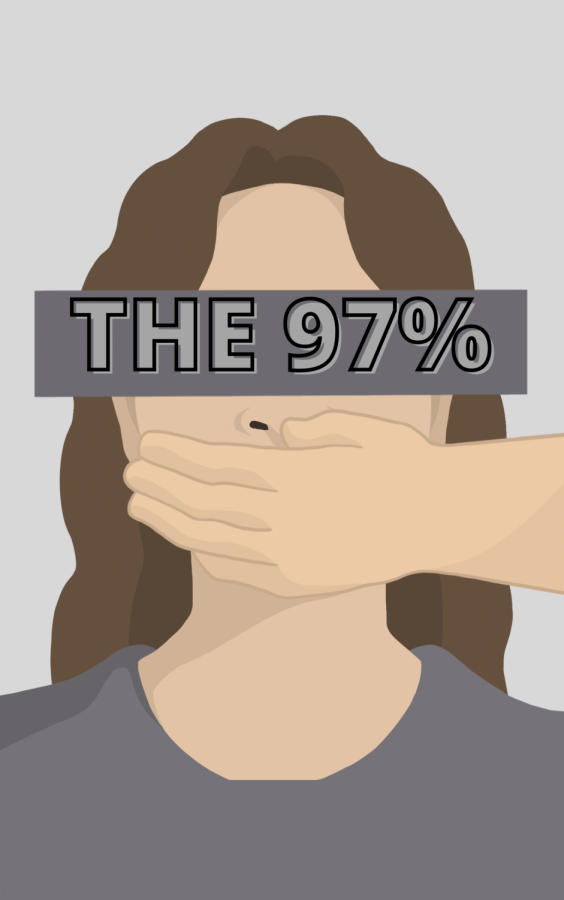THE 97%
May 18, 2021
After the kidnapping and killing of Sarah Everard by a male police officer on March 3, 2021, a sample study done by YouGov of over 1,000 women in the UK revealed that 97 percent of women between the ages of 18-24 have experienced sexual harassment or violence at some scale. Although the study was based in the UK, it has become representative of women globally. Most people may not even realize that a close friend or someone in their class is part of the 97 percent. With such a high percentage of women experiencing harassment and violence the patriarchy, or societal belief that power should be held by men, is inherently at play with the difference in how men and women are raised and continues to play in the reaction to the 97 percent statistic being released.
From the time most women are born and for their entire lives they are taught to take extra precautions such as carrying pepper spray, covering themselves up and not getting too drunk or high while these expectations are never set on men. Women are taught to do whatever they can to avoid being harassed instead of teaching others not to harass women.
Avery Bauereis (11), an active member of LSE’s Feminist Club, has taken note of these differences between how her and her older brother were raised.
“I’ve been taught to not be out late at night and make sure I’m around people I trust and my brother was just never taught that,” Bauereis said.
Despite all of these precautions being taught, 97% of women are still experiencing harassment and violence. When women share their harssment stories it generally calls into question what the woman was doing that led to the assault rather than believing she wasn’t responsible for being assaulted.
Tressa TeKolste, a teacher at Lincoln Southeast (LSE), who teaches women’s lit, has allowed her students to share personal experiences to better educate men on the realities of growing up as a woman in today’s society. In addition TeKolste has used her role as a teacher to better educate and raise awareness on the impact of the patriarchy.
“Feminism and (in)equity are things that impact us daily but they’re more subconscious and subliminal,” TeKolste said.
Due to much of the impact from the patriarchy and feminism being subliminal it becomes difficult for people to recognize. For example, parents using phrases like “boys will be boys” to excuse boys’ behavior from a young age and naturally expecting girls to behave better further feeds into the harmful cycle of the patriarchy.
“Men aren’t generally taught to respect women so they grow up thinking they can get away with everything and they usually can,” Bauereis said.
The inherently sexist and unequal expectations set on women and how they are raised in society further deprives men of the ability to learn about their privilege and use it to support women. Instead of men taking the time to better understand women’s struggles and listen to their personal experiences they react defensively and claim that women are exaggerating or doing it for attention.
An almost immediate reaction to the 97 percent statistic being released was many people, more specifically men, coining the harmful phrase “Not All Men” in hopes to defend men and make the point that not all men have harassed or been violent towards women. Others began to argue that the issue isn’t that not all men are harassing women, the issue is that almost all women have experienced harassment.
“Men think they’re not a part of the issue when they are, even if they’ve never personally assaulted anyone,” Bauereis said.
In addition to the phrase “Not all Men” the privilege of men showed as many of them began to question the validity of the 97 percent statistic claiming it was inaccurate and that it was unlikely for that many women to be harassed and assaulted.
TeKolste, who considers herself part of the 97% said “we hear the word harassment and we have this very narrow understanding but when we widen it to what harassment and assault can look like- from benevolent misogyny to the Sarah Everard [when Everard was kidnapped and murdered by a male police officer] situation, it’s a very wide spectrum which is why the number is so high.”
If men took the time to understand that the 97 percent statistic accounts for such a wide spectrum of what harassment and assault means it would allow others to better understand instead of reacting defensively.
Growing up in a patriarchal and misogynistic society that raises men and women differently plays a role in the 97 percet statistic being so high. In addition the natural privilege of men showed in their reaction and disbelief when the 97 percent statistic was released. Although the statistic primarily affects women, if men were willing to take a stand realize they have the power to help and speak in support of women, society can work towards lowering the 97 percent and making the world a better place for all people.









